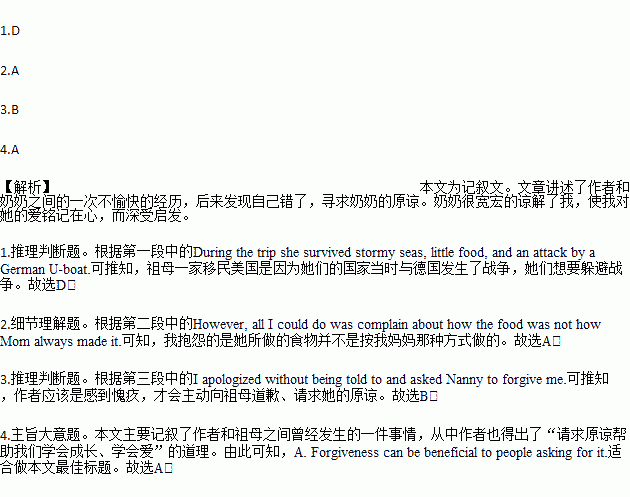题目内容
My grandma whom we all called Nanny was a solid, first-generation, Italian immigrant. She came to this country with her family on a tiny ship during World War I when she was only 8 years old. During the trip she survived stormy seas, little food, and an attack by a German U-boat. After getting here, her large family worked hard to build a new life in America. They never had much money but were rich in love.
One day, when I was about 5 or 6 years old, my parents and brothers went on a trip. It was just me and Nanny in the house for the weekend. Nanny seemed so happy to be taking care of me all by herself. She made me a special breakfast that first morning. However, all I could do was complain about how the food was not how Mom always made it. Nanny quietly put down the plate and went into the living room. I followed a minute later and saw that she had tears in her eyes. It was the first time I had ever seen my strong and proud grandmother cry and I was the one who had caused it.
I walked over to Nanny, climbed on her lap, and for the first time in my short life I did something else too. I apologized without being told to and asked Nanny to forgive me. She smiled, rubbed my head, and told me I was a good boy even though I didn’t feel like one then.
That memory just like my Nanny’s love will stay in my heart forever. It is a sign of both strength and wisdom. Asking for forgiveness helps us to learn to grow, and to love.
1.Why did Nanny’s family immigrate to America?
A. Because they suffered starvation in their homeland.
B. Because they wanted to start a rich life in the new land.
C. Because they tried to get away from the terrible climate.
D. Because their country was in war and they needed peace.
2.The boy complained to Nanny that the food _______.
A. wasn’t cooked the way his mom did
B. was served a bit later than usual
C. was prepared in a special way
D. was just to his parents’ taste
3.When seeing Nanny crying in the living room, the author felt _______.
A. surprised B. ashamed
C. shocked D. annoyed
4.What does the author mainly want to tell us?
A. Forgiveness can be beneficial to people asking for it.
B. Hardships can make children more indifferent (漠不关心的).
C. Grandparents are more tolerant than their grandchildren.
D. Family ties can sometimes be misused.


 visited B. visits
visited B. visits